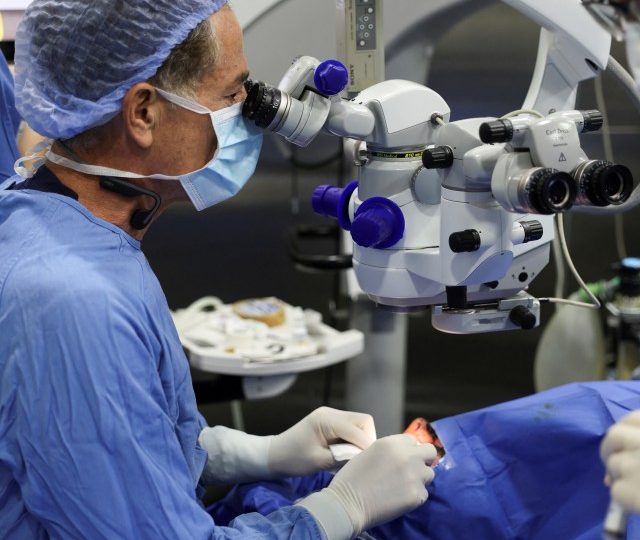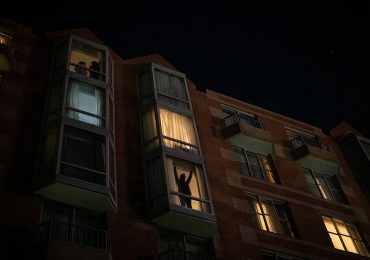DOCTORS in Lebanon have been overwhelmed by casualties after two waves of blasts – with many left blinded.
Skilled physicians say they have never had to surgically remove more eyes before as Hezbollah chiefs labelled the strikes a possible “declaration of war” from Israel.
ReutersLebanese eye surgeons work on blast victims[/caption]
XAn injured man lays on the ground following the sabotage wave on Tuesday[/caption]
ReutersHezbollah chief Hassan Nasrallah gave a televised address following the blasts[/caption]
Hezbollah Secretary General Hassan Nasrallah spoke today on the chilling attacks against his military group.
Israel’s Mossad spy agency allegedly caused the blasts after they were accused of planting a small amount of explosives inside thousands of pagers ordered by Hezbollah months earlier.
Nasrallah added that the group intends to seek revenge for the attacks that “crossed over all the red lines” and will not stop until the war in Gaza ends.
During his speech, Israel are believed to have continued to strike Hezbollah targets inside Lebanon.
Israeli planes reportedly flew at a low altitude over Beirut as Nasrallah spoke with several sonic booms and massive explosions being heard.
The Israeli Defense Forces say the attacks are intended “to degrade Hezbollah’s terrorist capabilities and infrastructure”.
It comes as initial reports say 32 people have been killed with over 3,450 injured as a result of the two-pronged blasts this week.
Doctors across Lebanese hospitals say they have been overwhelmed by a flood of admissions following the two waves of chaos that started when thousands of pagers exploded on Tuesday.
A day later walkie-talkies used by Hezbollah fighters started to vibrate in their pockets before blowing up – leaving many casualties blinded or with seared limbs.
Some of the blasts resulted in fingers or entire hands being ripped off as those who had not taken pagers and walkie talkies from pockets suffered appalling leg and groin injuries.
The devices are believed to have detonated almost simultaneously when the targets read a coded message.
This was tactically done in an attempt to maximise damage, say reports.
Dr Elias Warrak, an ophthalmologist at Mount Lebanon University Hospital, described Wednesday as “the worst day of [his] life as a physician”.
He revealed at least 60 per cent of the people he had treated on had lost at least one eye with many losing their sight completely.
Others had faced even more consequences with some suffering brain damage.
He added: “I believe the number of casualties and the type of damage that has been done is humongous.
“Unfortunately, we were not able to save a lot of eyes, and unfortunately the damage is not limited to the eyes – some of them have damage in the brain in addition to any facial damage.”
The Iranian ambassador to Lebanon was one of those who reportedly lost an eye after he was struck by an explosion.
Warrak described the past few days as a “nightmare”, as he spoke with the BBC about working through to 4am on Wednesday.
The doctor added: “Most of the patients were young men in their twenties and in some cases I had to remove both eyes.”
Lebanon’s Health Minister Firas Abiad said the overcrowding at the countries hospitals was being dealt with by the wounded going to several different hospitals.
ReutersDoctor Elias Warrak says he has never had to surgically remove more eyes before due to the blasts[/caption]
ReutersOther injuries saw people losing their limbs[/caption]
A man collapsed on the floor following his device explodingX/NewsWaradana
TELEGRAM/UNPIXSOne man’s bag exploded after a pager detonated while he was shopping[/caption]
He added that Turkey, Iraq, Iran, Syria and Egypt have all offered to help treat patients.
Shocking videos of the two-day blasts circulated on social media showing the wave of explosions striking across Lebanon.
In-store CCTV footage caught people struck down in the middle of their shopping by the pagers on Tuesday.
One shows a man’s bag exploding in a grocer with other shoppers sprinting for their lives away from the man as he is knocked to the ground by the detonation.
Another shows a person paying for items at a till before he checks the pager on his hip and it explodes in his hands.
Other footage showed maimed targets lying on the ground missing hands or fingers and having large wounds on their hips and legs.
Beirut’s street turned to chaos as people fled buildings for safety and the city’s hospitals treated the bloodied survivors.
At least 12 were killed on Tuesday with 3,000 others left wounded, initial reports say.
The second sabotage strikes rocked Lebanon’s south as rigged hand-held radios used by Hezbollah detonated.
Shocking footage shows a bloodied man on the floor as passersby rush to help him and others flee following an explosion in Beirut.
Unfortunately, we were not able to save a lot of eyes, and unfortunately the damage is not limited to the eyes – some of them have damage in the brain in addition to any facial damage
Dr Elias Warrak
An apartment building and vehicles were also seen on fire as sirens wailed for a second day across the Lebanese capital.
Panicking Hezbollah fighters were even seen tearing the batteries from their walkie-talkies and tossing them into a pile on the ground as ambulances raced to the scene.
The electrical explosions resulted in 20 deaths and left another 450 injured.
Hezbollah and Lebanon immediately blamed Israel for the blasts but PM Benjamin Netanyahu is yet to comment on its alleged involvement.
It comes as Israeli warplanes have blasted Hezbollah military buildings and a weapons depot in seven areas of Lebanon as a “new phase” of its anti terror war ramped up.
Warplanes fired on Shekhin, A-Taiba, Bleida, Mis al-Jabal, Eitaron, al-Khyam and Kfar Kila in southern Lebanon overnight and heavy artillery also opened up across the northern border.
The strikes came as Hezbollah continue to fire rockets into northern Israel.
Five people were injured by rockets towards Upper Galilee in northern Israel.
Two Israeli soldiers have been killed near the border with Lebanon, the IDF said today.
One was killed by a drone with the other being struck by an anti-tank missile fired by Hezbollah.
Israel and Hezbollah have been exchanging fire across the Israeli-Lebanon border in parallel with the war Israel has waged in Gaza against Hamas after October 7.
Tens of thousands of people have had to flee the border area on both sides.
Hezbollah have reportedly killed 26 civilians and 20 soldiers and forced another 80,000 Israelis to head south to escape the blitz.
Netanyahu vowed on Wednesday to return the evacuated Israelis “securely to their homes”.
Israeli Defence Minister Yoav Gallant declared the start of a “new phase” of war as the country’s army moved north.
The announcement paves the way for the first full-scale invasion of southern Lebanon since 2006 in a drive to push back the terror group and allow Israelis to return home.
But the risky move raises the spectre of Hezbollah backers, Iran being drawn into a devastating regional conflict.
Where did the pagers come from?
By James Halpin, Foreign News Reporter
Iranian proxy Hezbollah ordered the pagers months ago but never thought the quaint piece of tech could be tampered with.
Hezbollah shifted to pagers after the group’s leader told members to stop using phones in February over fears they could be tracked by Israeli spies.
A senior Lebanese security source said the group had ordered 5,000 beepers made by Taiwan-based Gold Apollo, which were brought into the country in the spring.
But Gold Apollo told media in Taipei today the specific order was manufactured by BAC Consulting KFT in Budapest.
Gold Apollo boss Hsu Ching-kuang said BAC asked to manufacture their own pagers with the company’s trademark and they were paid from a mystery Middle Eastern bank account, NPR reports.
BAC Consulting chief executive Cristiana Bársony-Arcidiacono confirmed to media that her company worked with Gold Apollo.
But said, “I don’t make the pagers. I am just the intermediate.”
At some point during the manufacture, the devices were modified by Israel’s spy service with a small amount of explosive.
The AR-924 pager is described as being “rugged” and contains a rechargeable lithium battery with 85 days of battery life.
Their longevity would be important in Lebanon which has suffered major power outages.
Pagers also run on a different wireless network than mobile phones, making them more resilient in emergencies and harder for Israel to hack digitally.
The affected pagers were only delivered to Hezbollah recently, but other associates of the group were also injured, including the Iranian ambassador to Lebanon.
X/ME_Observer_A building caught fire after the second wave of blasts[/caption]
X/RulaelhalabiA destroyed device following a blast[/caption]
The Iranian ambassador to Lebanon Mojtaba Amani is said to have lost an eye in the blastAlamy
Leave a comment








